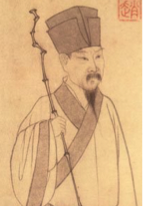 The 11th century Song dynasty poet and essayist Su Tung-po is also sometimes referred to as Su Shi or Su Tungpo. He was a multi-talented man, with art, calligraphy and gastronomy added to his literary skills. He had a keen interest in pharmacology and was an important political figure, working against the New Policy party that was led by Wang Anshi. His many written works include authoritative pieces on travel experiences in China and he wrote knowledgeably about the early days of the iron industry in Asia. His name lives today for many reasons, not least the fact that a popular dish found in Hangzhou cuisine is called Dongpo pork.
The 11th century Song dynasty poet and essayist Su Tung-po is also sometimes referred to as Su Shi or Su Tungpo. He was a multi-talented man, with art, calligraphy and gastronomy added to his literary skills. He had a keen interest in pharmacology and was an important political figure, working against the New Policy party that was led by Wang Anshi. His many written works include authoritative pieces on travel experiences in China and he wrote knowledgeably about the early days of the iron industry in Asia. His name lives today for many reasons, not least the fact that a popular dish found in Hangzhou cuisine is called Dongpo pork.
Su was born on the 8th January 1037 in Meishan, close to Mount Omei. This is now in the Sichuan province of China and he attended his local village school receiving tuition from a Taoist priest. Both of his parents and his brother were very well educated so it followed that Su should also become so. Along with his brother Zhe he studied for high level civil service exams in order to reach the standard known as jinshi which was a sure pathway to high office in government.
He soon came to the attention of Emperor Renzong who tasked one of his high profile courtiers, the writer and statesman Ouyang Xiu, to set exacting standards for the two brothers in their attempts to pass the jinshi examinations. Both passed with honours and, thus, their paths were clear to high office. Su filled a number of posts in government over the years and he also served as a magistrate. He maintained a strong social conscience though and wrote poems and letters to the Emperor pointing out the potential for rebellion amongst the oppressed workers in the iron industry.
He was constantly at odds with Wang Anshi and his controversial policies and it was suggested that the chancellor had Su imprisoned on the pretext that the poems he was writing were anti-Emperor when, in fact, they were nothing of the kind. On his release he went into exile, taking up Buddhist meditation and living the quiet life. He settled on a farm named Dongpo, afterwards taking that name for his literary pseudonym. His poetry at this time is generally believed to be some of his best and it led to his being recalled to government for a short time before suffering a second period of banishment from 1094 to 1100.
His outspoken poetry was often his downfall with his accusers citing the work as anti-establishment when all Su was trying to achieve was to highlight bad government policies. His final pardon came in the year 1100 and he was sent to Chengdu to take up another government post. However, during the journey he died in Changzhou, Jiangsu province. His death heralded a great clamour for his writings and works of calligraphy and he became even more popular a poet in death than he was during his lifetime. Even now over 2,700 of his poems survive to be read by modern literary students of Chinese poetry. Many of them are very short though, examples being the following two poems which both feature geese. The first is called Pu Suan Tzu:

Then there is an even shorter one called Remembrance, a very brief summary of the life of man:

Su Tung-po died on the 24th August 1101, aged 64.

